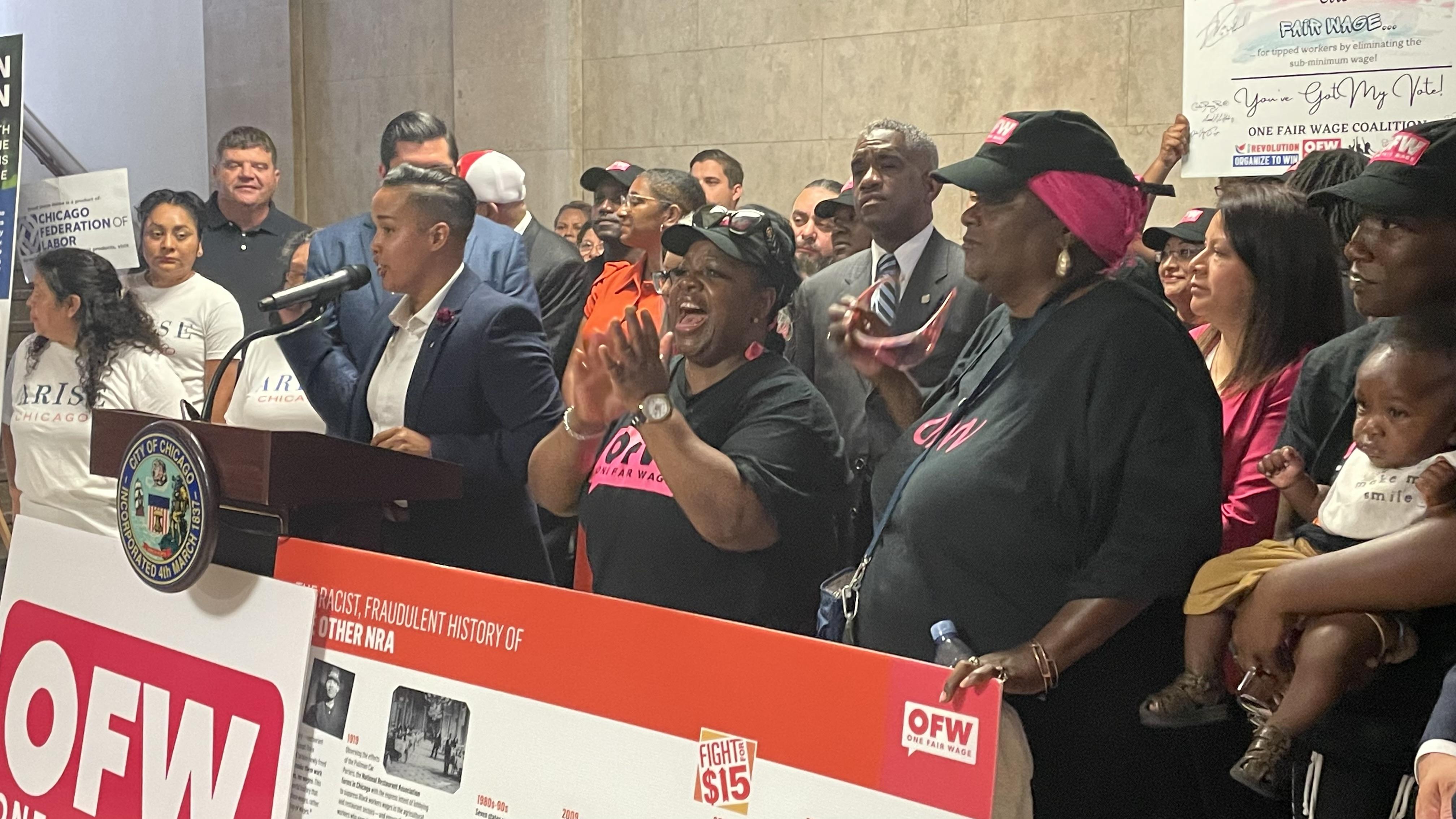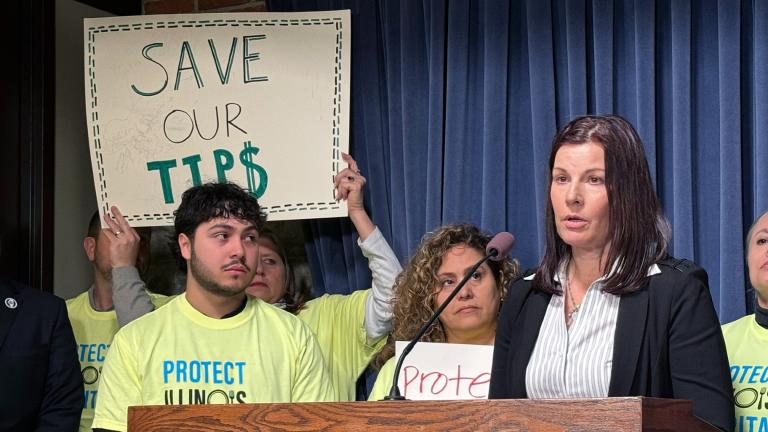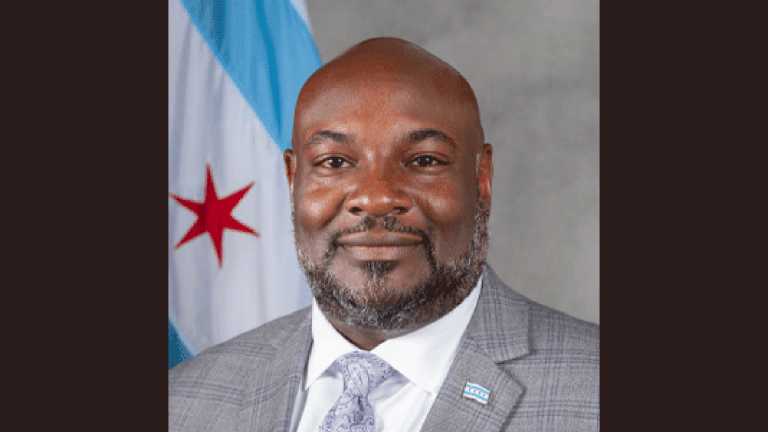Video: The WTTW News Spotlight Politics team on the day’s biggest stories. (Produced by Alexandra Silets)
All Chicago businesses would be required to pay their workers the same minimum hourly wage, regardless of whether they earn tips, and all employees would be entitled to 15 days of paid time off under two proposals introduced to the Chicago City Council on Wednesday.
Taken together, the two proposals are likely to form the foundation of Mayor Brandon Johnson’s agenda when it comes to labor. A former organizer for the Chicago Teachers Union, Johnson enjoyed the unanimous support of Chicago’s progressive labor organizations.
Johnson has endorsed the One Fair Wage national campaign, which has cast the push to end the tipped minimum wage as part of a larger fight for justice, saying workers who earn the so-called tipped minimum wage are more vulnerable to sexual harassment, wage theft and abuse than other employees.
But even with 25 cosponsors, the proposal to eliminate the tipped minimum wage by July 2025 failed to advance Wednesday, with Ald. Anthony Beale (9th Ward) preventing it from heading directly to a committee hearing and vote.
Johnson’s mayoral campaign platform called for an end to the tipped minimum wage, noting that those who rely on tips to earn a living wage are more likely to be Black and Latina women. Johnson was endorsed by the Service Employees International Union Healthcare Illinois, which is part of the One Fair Wage campaign.
Ending the tipped minimum wage will be “good for workers, working families, and the future of our city,” Johnson said at an event organized by the One Fair Wage campaign.
“We have a moral obligation to make our people whole,” said Ald. Jessie Fuentes (26th Ward), noting that the practice of allowing employers to pay their workers less than the minimum wage — as long as tips make up the rest — originated in slavery.
Fuentes said she was not concerned that the measure failed to advance Wednesday, telling reporters that she expects it to be part of Johnson’s proposed 2024 spending plan.
Fuentes said she and other supporters were open to delaying the elimination of the tipped minimum wage until July 2027, but not any longer.
Chicago’s minimum wage for most workers rose to $15.80 per hour on July 1, an increase of 40 cents. That comes two years after Chicago’s minimum wage hit $15 per hour after a six-year fight that energized the labor movement and fueled new laws designed to improve the working conditions for the city’s lowest-paid workers, who are disproportionately Black and Latino.
In 2019, former Mayor Lori Lightfoot blocked a proposal backed by progressive members of the City Council to eliminate the tipped minimum wage by 2023. That proposal faced intense opposition from restaurant industry groups.
Ald. Carlos Ramirez Rosa (35th Ward) said Wednesday workers who earn tips were left behind in 2019 when the City Council agreed to set the city’s minimum hourly wage at $15 starting in July 2021.
“We will fix that,” said Ramirez Rosa, Johnson’s floor leader.
The minimum hourly wage for employees of large Chicago businesses who earn tips rose by 48 cents on July 1 to $9.48 per hour, officials said.
 Ald. Jessie Fuentes (26th Ward) said the tipped minimum wage should be eliminated to protect workers from sexual harassment, wage theft and abuse. (Heather Cherone / WTTW News)
Ald. Jessie Fuentes (26th Ward) said the tipped minimum wage should be eliminated to protect workers from sexual harassment, wage theft and abuse. (Heather Cherone / WTTW News)
Paying all workers the same minimum wage, regardless of what they earn in tips, will benefit Chicago’s restaurant industry and individual eateries, Ramirez Rosa said.
The push is also supported by Ald. Mike Rodriguez (22nd Ward), the chair of the City Council’s Workforce Development Committee.
Saru Jayaraman, the president of the One Fair Wage national campaign, said paying tipped workers the same minimum wage could help boost youth employment, a major goal of Johnson’s efforts to reduce crime and revitalize Chicago’s South and West sides.
The restaurant industry is the largest employer of Chicagoans age 16 to 24, and Fuentes said raising their wages could reduce homelessness and crime throughout the city.
A proposal to end the tipped minimum wage is likely to be a major point of negotiation during the debate over the 2024 spending plan, Johnson’s first, set to take place this fall.
The push is expected to face fierce opposition from the restaurant industry, who could push Johnson to phase out the tipped minimum wage over a longer period of time.
Leaders of the Employment Policies Institute urged the City Council to reject the proposal, saying it would lead to layoffs and lower earnings for restaurant employees.
A separate measure introduced Wednesday by Rodriguez would require Chicago employers to offer their workers one hour of paid leave for every 15 hours worked, regardless of whether they are sick.
That would entitle Chicago employees to 15 days of paid time off every year, according to the proposal backed by the Chicago Federation of Labor.
If approved, the measure would be the largest expansion of paid time off in any city in the United States, according to the Chicago Federation of Labor.
Starting in 2024, a measure signed into law by Gov. J.B. Pritzker will require employers statewide to give their workers at least one hour of paid leave for every 40 hours worked. That will entitle employees to five days of paid time off every year, according to the law.
Because Chicago has a separate law, approved in 2016, requiring employers to give their employees paid sick leave, the state law exempts Chicago. Chicago employees earn one hour of paid sick leave for every 40 hours they work, or at least five days every year.
That measure passed after a fierce political battle, and has not been adjusted since.
The state law also exempts employees covered by a collective bargaining agreement in the construction industry and parcel delivery industry, and Chicago’s ordinance would not trump labor agreements, Rodriguez said.
Contact Heather Cherone: @HeatherCherone | (773) 569-1863 | [email protected]








